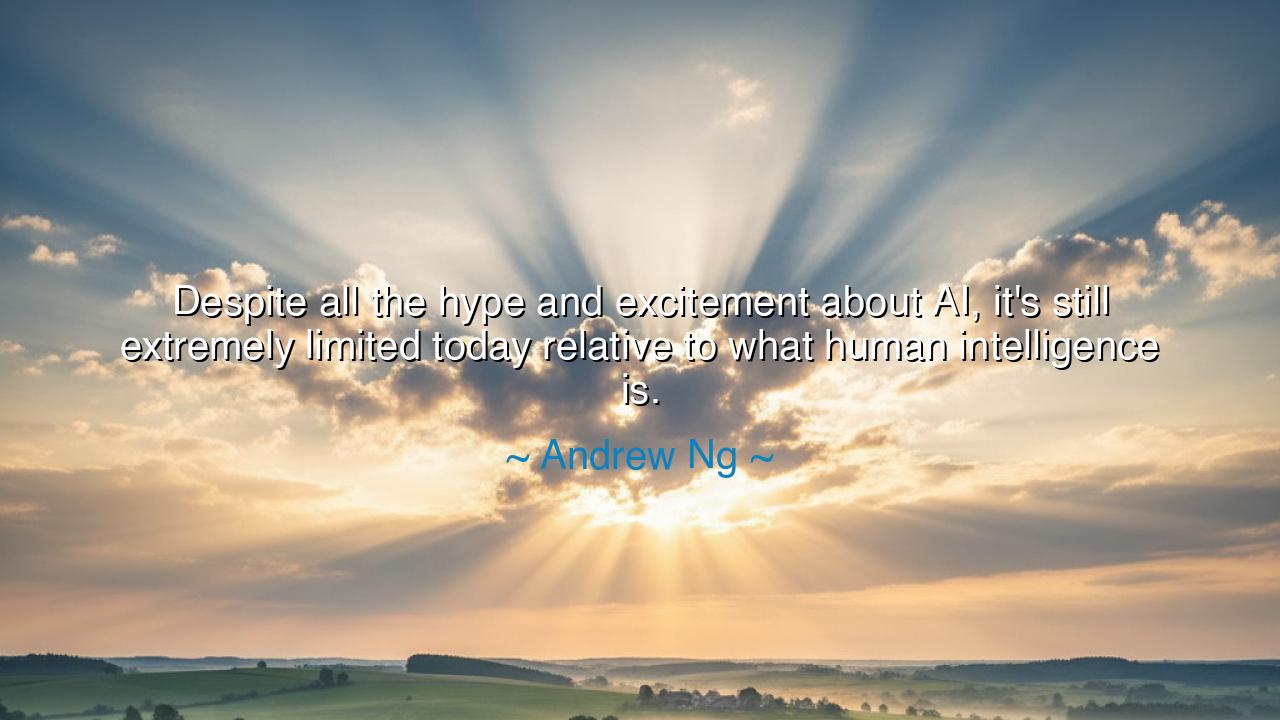
Despite all the hype and excitement about AI, it's still
Despite all the hype and excitement about AI, it's still extremely limited today relative to what human intelligence is.






“Despite all the hype and excitement about AI, it's still extremely limited today relative to what human intelligence is.” – Andrew Ng
In this statement, Andrew Ng, one of the great pioneers of our technological age, speaks with the clarity of a sage who sees beyond the fever of progress. In an era where men marvel at their own inventions and proclaim their machines as the new gods of thought, his words are a calm reminder of humility. For though Artificial Intelligence has risen like a new Prometheus, carrying fire from the heavens of computation, it remains but a shadow beside the living brilliance of the human mind. The hype and excitement surrounding it are loud, but the truth, as Ng reveals, is quieter and deeper: AI is still limited, bound by the walls of the algorithms that birthed it, far from the boundless intuition and spirit that dwell within the heart of man.
In the days of the ancients, when artisans first shaped tools from stone, they too must have felt the thrill of creation. Each tool extended their reach, each invention magnified their strength — yet none replaced the hand or the will that wielded it. So too is AI the latest and most dazzling of our tools. It calculates faster than the mind, remembers more than the scholar, predicts patterns with uncanny precision — and yet, it does not understand. It cannot feel wonder, cannot grieve, cannot dream. It knows the patterns of words but not the weight of meaning; it imitates emotion but does not feel compassion. It is an echo, not a soul. And Ng, in his wisdom, reminds us that the essence of intelligence is not mere computation but consciousness — that living spark that turns data into wisdom, and knowledge into kindness.
Consider the story of Deep Blue, the machine that defeated the chess champion Garry Kasparov in 1997. The world trembled at that victory, thinking perhaps that the age of human superiority had ended. Yet in the aftermath, Kasparov observed something profound: the computer had not triumphed by genius but by force — by processing countless possibilities faster than any mortal mind. But true intelligence, he said, lies not in endless calculation but in judgment, in knowing which possibilities matter and why. Kasparov later played in what he called “centaur chess” — man and machine together — and found that the partnership of human intuition and artificial speed surpassed either alone. Thus, even in defeat, humanity discovered its own supremacy: that the mind which creates is greater than the machine that obeys.
Ng’s words also carry a warning. In our pride, we may begin to idolize the machine and forget our own divine inheritance. The danger is not that AI will surpass us, but that we will diminish ourselves — that we will cease to cultivate the virtues of thought, empathy, and imagination, believing them obsolete. But the human intelligence Ng speaks of is more than logic; it is the power to love, to suffer, to create beauty from pain. No machine can compose a poem that bleeds truth, or paint a picture that stirs the heart, or hold a dying hand and whisper comfort. These are not algorithms, but the eternal expressions of the human spirit — the mysterious depth from which all art, morality, and meaning arise.
Throughout history, man’s creations have always reflected his aspirations — and his limits. The clock mimicked the rhythm of time, but not its mystery. The telescope extended sight, but not vision. The machine may mimic intelligence, but not understanding. AI can write symphonies, but it does not hear the silence between notes. It can diagnose disease, but it does not fear death. It can drive a car, but it cannot choose where to go, or why. Its intelligence is functional, not moral; powerful, but narrow. Like a blade, it can heal or harm, depending on the hand that holds it.
Therefore, Ng’s teaching is not despair but direction. He calls us to wisdom, not worship — to recognize AI’s promise without losing sight of humanity’s purpose. Let us use these new tools as extensions of our compassion, not replacements for it. Let AI handle the labor of data so that man may labor in thought, creativity, and justice. Let it magnify not our greed, but our generosity; not our vanity, but our vision. The true measure of progress is not whether machines can think, but whether mankind can still feel, discern, and choose rightly in a world made more powerful by its own inventions.
So, let this be the lesson for the age to come: honor the machine, but cherish the mind. Remember that the algorithms may learn from us, but they cannot become us. Guard your humanity as the flame that no technology can replicate. For the glory of creation lies not in silicon or code, but in the living mystery that thought cannot grasp — the infinite depth of the human intelligence, through which even the stars themselves are understood, named, and loved.






AAdministratorAdministrator
Welcome, honored guests. Please leave a comment, we will respond soon